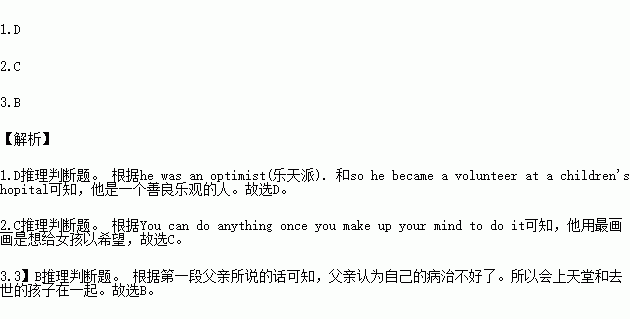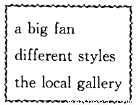题目内容
My father suffered a disease once, but he was an optimist(乐天派).He wanted to do something to keep himself busy, so he became a volunteer at a children's hopital. Sometimes one or two kids would die. At this time he would tell the heart-broken parents of the children that he would be with their children in heaven and that he would look after them there.
There was a girl with a disease that paralyzed(瘫痪)her from the neck down. She couldn't do anything. My dad decided to help her with his true love. He started visiting her, bringing paints, brushes and paper. He began to put the paintbrush in his mouth to paint. He didn't use his hands. He would visit her whenever he could and paint for her. "You can do anything once you make up your mind to do it,”he said. Finally, she began to paint using her mouth, too.
Later, my dad recovered and returned to work. He worked at the volunteer counter in the hospital. One day, he noticed the front door open. In came the little girl who had been paralyzed. She was walking! She hugged my dad tightly and gave him a picture she had done using her hands. At the bottom it read: "Thank you for helping me walk again!”
After that my father often said love was more powerful than doctors.
1.Which words best describe the writer's father?
A. Patient and funny.
B. Strong and serious.
C. Busy and hard-working.
D. Kind and optimistic.
2. Why didn't the writer's father use his hands when painting for the girl?
A. He was not good at drawing.
B. He liked the taste of paint.
C. He wanted to give the girl hope.
D. He was an experienced artist.
3.What can we infer from the writer's father's words in Paragraph 1?
A. He cared little about the children who died.
B. He didn't think he would survive his disease.
C. He must know those heart-broken parents.
D. He used to work as a doctor in that hospital.
 阅读快车系列答案
阅读快车系列答案

